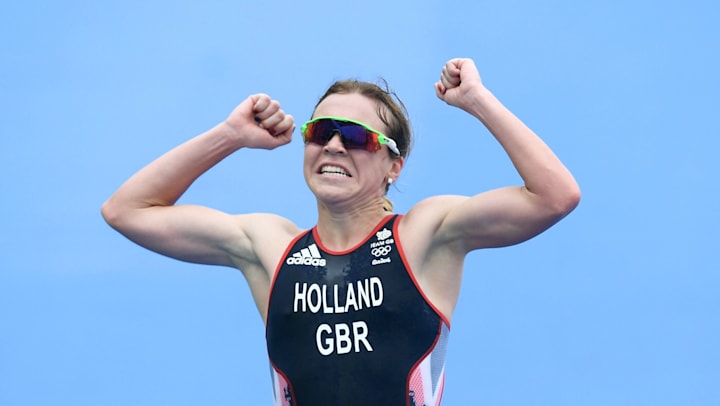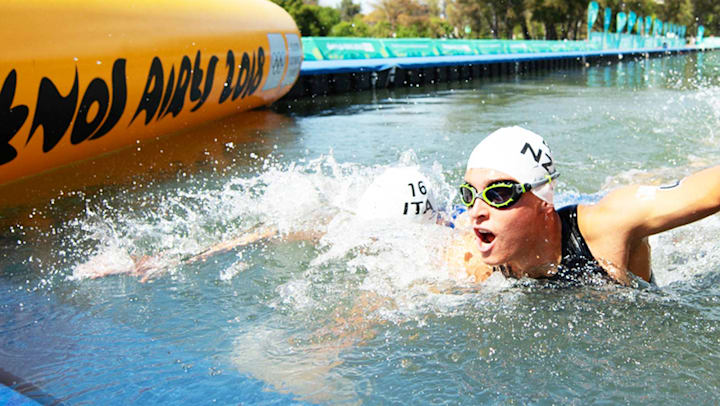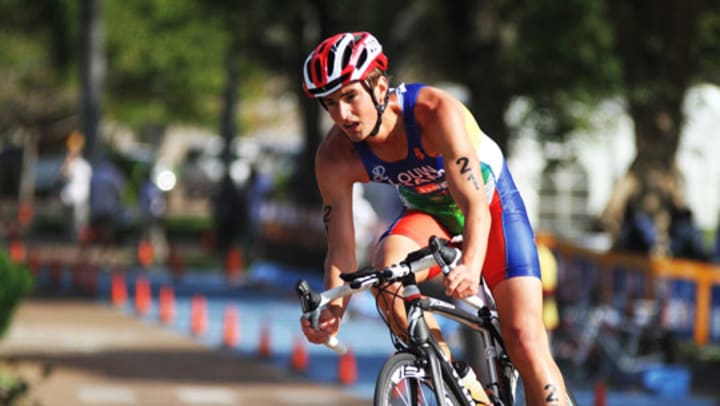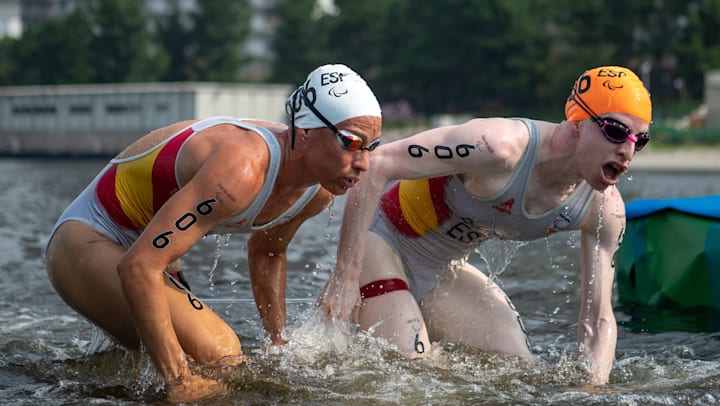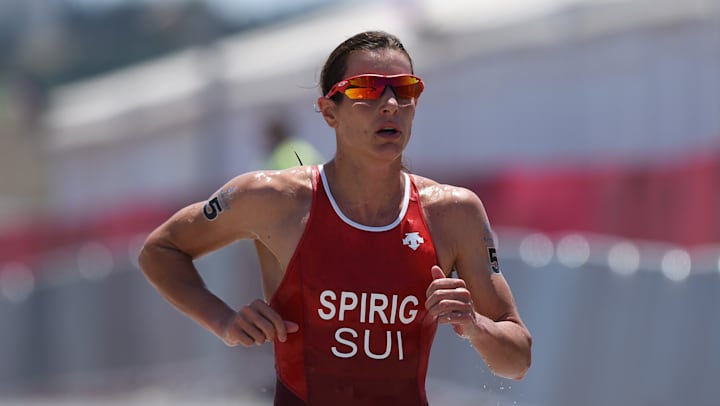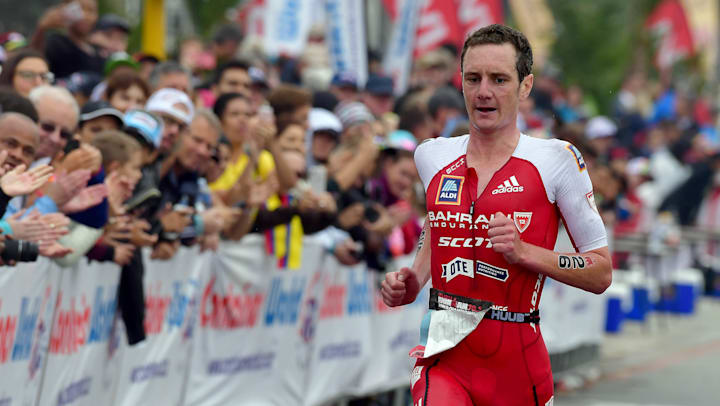What is the new triathlon mixed relay?
Triathlon mixed gender relay event will make its debut at the Tokyo 2020 Games in 2021, but do you know what's involved? We asked athletes and coaches for their thoughts of the new Olympic discipline, and why it promises to be a fascinating and frantic race to the finish.
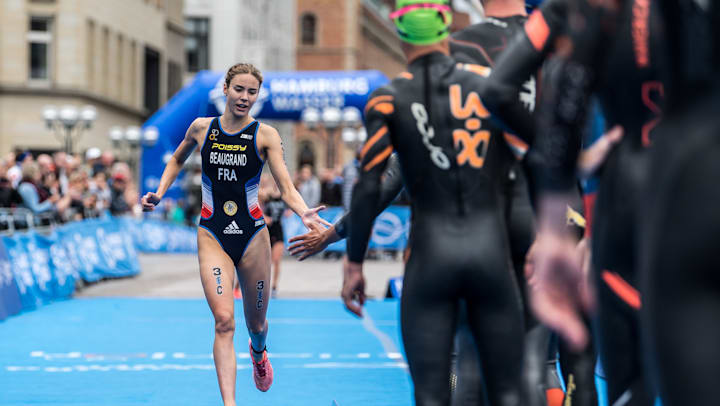
It’s "fast and furious", said two-time Olympic triathlon champion Alistair Brownlee.
On 31 July 2021, the triathlon mixed relay will make its Olympic debut at Tokyo 2020 and the world will be able to watch one of the Games' most furious events.
Ten teams will compete in the race, with each one comprising four athletes: two men and two women.
The race will go by in a flash - less than 90 minutes. It's fast, it's tactical, and it's exhausting.
"I feel a lot of adrenaline in mixed relay. We don’t have it when we run alone." - Alistair Brownlee to Tokyo2020.Org
What's involved in triathlon mixed relay?
Each athlete will have to swim for 300m, cycle for 8km, and run for 2km before tapping the hand of their teammate to pass the relay.
The total time of a race is usually less than 90 minutes, with each triathlete's effort generally lasting around 20 minutes.
"I think it’s fantastic that men and women get to race together, and it’s great for spectators because it’s fast and furious," said the senior of Britain's Brownlee brothers.
A different kind of pressure is also felt when taking part in the event, as France's 2018 and 2020 World Champion Léonie Périault explained to Tokyo 2020.
"The team spirit is awesome. I feel a lot of adrenaline in mixed relay. We don’t have it when we run alone. I’m not competing alone, I want to go beyond the edge for my teammates."
"This little fear, not to succeed and make the whole team fail... it makes us thrill!"
Separate triathlon relay events for male and female competitors were contested at the world championships from 2003-2007, but the success of the 4x4 mixed event has paved the way for it to become the only relay event now featuring on the international sporting calendar.
This relatively new discipline began in 2009 when the first World Championships were held, and its level of popularity has only grown.
A year later, the discipline made its debut at the Singapore 2010 Youth Olympic Games.
In 2014, the Triathlon Mixed Relay World Championships were held in Hamburg for the first time. Ever since, the German city has played host to the annual event. In 2016, some 250,000 spectators lined the streets.
It will make its Summer Olympics debut at the Tokyo 2020 Games in 2021.
What’s new about the triathlon relay discipline?
Beyond helping bring equality to the most gender-balanced Games in history, the triathlon mixed relay will promote "unity between male and female athletes", according to Iñaki Arenal, the head coach of the Spanish triathlon mixed relay team, who spoke to Tokyo 2020.
He said the event will involve, "different tactics due to the great variability the competition has through its segments, and above all, it is a very spectacular event because it is really fast".
To compensate for the different strategies involved, training plans have been modified to fit in with the challenges the new event presents.
Arenal takes that into account at Spain's national training camp.
"Obviously, for mixed relay, the athletes need to be stronger and faster, so we have to change the pace of the training sessions in order to improve the power than the endurance," he said.
Athletes have to increase their power as the race distance is significantly shorter compared to an Olympic Triathlon, which involves a 1.5km swim, a 40km cycle, and a 10km run.
For the athletes, the event is a good opportunity for redemption - the ability for one final shot at winning a medal.
"You only had one chance in the past," explained Brownlee, "So if you lost, that was it."
In order for the athletes to give their all, as Arenal said, tactics play a significant part. Despite the order of athletes being fixed - female, male, female, male - the decision on which athlete fills these slots is crucial.
"We never know the composition, neither the order of the athlete, long before the race," Périault said.
"And this order has changed a lot. We always gather together, and each athlete gives his opinion and we define the order."
Who to watch in the triathlon mixed relay at Tokyo 2020?
Mixed relay has been dominated by France over the past few years and at the 2020 championships in Hamburg, they secured their third consecutive world title - their fourth in six years.
They are expected to be among the favourites for the Tokyo 2020 Games in 2021, and already have experience of winning in the city, having previously won the Olympic test event in 2019.
For Périault, Team France is dominating because of their unity and similar characteristics.
"We don’t have any weak points," she said.
"The team changes a lot but we always manage to perform. We have a very homogeneous team. We also know each other very well, and that is a strong point of Team France. We have a nice ambience and we are all united."
With Ali Brownlee - along with his brother Jonny, himself an Olympic silver and bronze medallist - Great Britain will be among those targeting top spot on the podium.
Team GB finished third in the 2020 World Championship race, but Alistair is determined to secure gold in both the mixed and individual events.
"I’d absolutely love to get two gold medals for Great Britain," he said.
Of course, Team USA will also be one to watch as they finished second in the 2017 and 2020 World Championships, as well as third in 2018.
It promises to be a fascinating and frantic race to the finish.
Jorgensen races to women’s triathlon gold
US triathlete Gwen Jorgensen produced the perfect race to win the Olympic gold. She stayed with her rivals on the bike before surging clear of defending champion Nicola Spirig-Hug of Switzerland on the run.
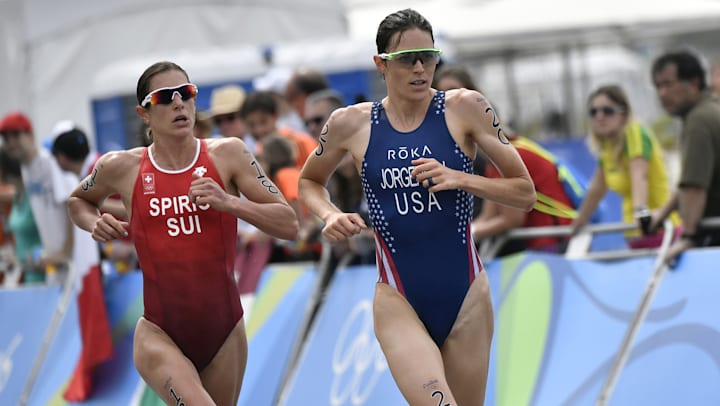
Jorgensen has led the field in women’s triathlon over the last two years but usually wins her races by chasing down the stronger cyclists during the 10km run. In Rio, she gave her all on the hilly 40km bike course and defeated Spirig-Hug in the final discipline to win America's first gold in the sport since it was introduced to the Games in 2000.
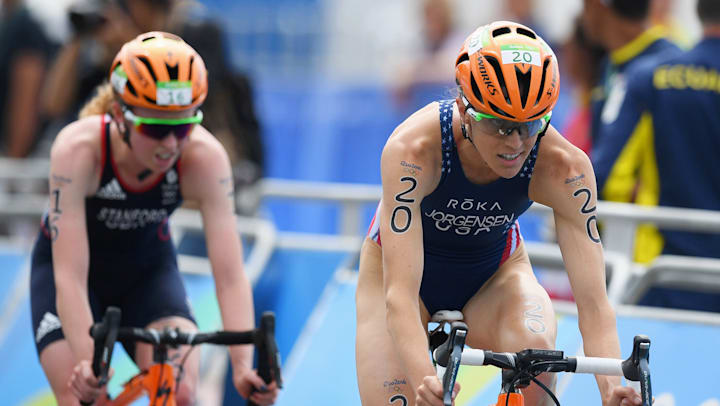 Getty Images
Getty ImagesAfter a sea swim off Copacabana Beach, a group of 18 quickly formed on the bike leg, including all the favourites. Spirig-Hug and Jorgensen rolled into the second transition together. Strong runner Jorgensen finally made her move with an injection of pace at the 8km mark that immediately took her clear and allowed her to enjoy her run up the finishing chute with a beaming smile.
 Getty Images
Getty Images